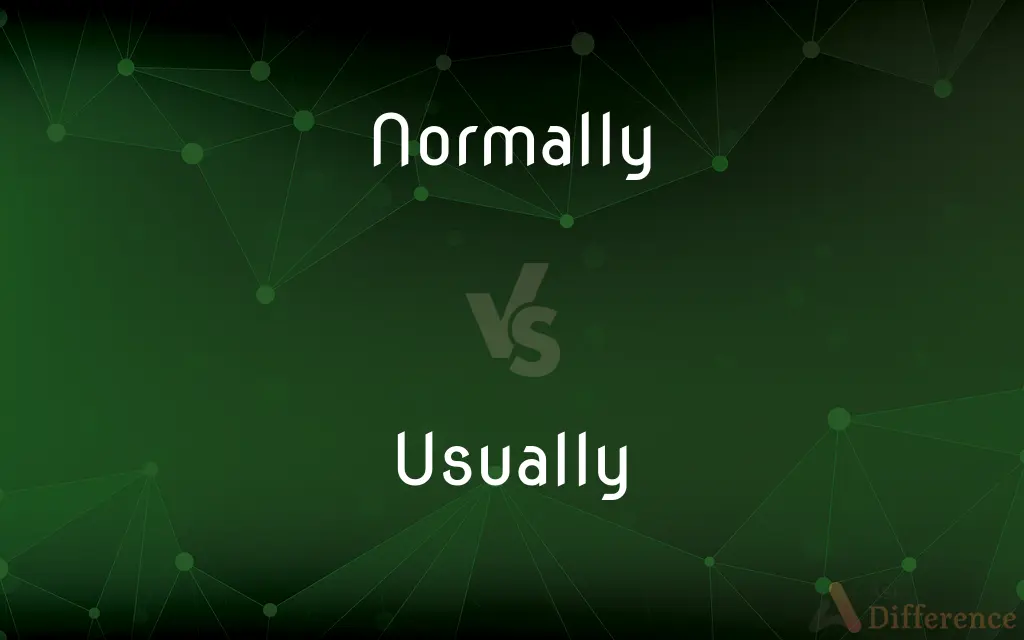Normally vs. Usually — What's the Difference?
By Tayyaba Rehman — Updated on October 13, 2023
Normally refers to a standard or typical condition or state, while Usually indicates a frequent occurrence or commonality. Both imply regularity but in slightly different contexts.

Difference Between Normally and Usually
Table of Contents
ADVERTISEMENT
Key Differences
Normally and Usually are adverbs that describe the regularity or commonality of an event. Normally implies a condition or state that conforms to a standard, expectation, or regular pattern. It denotes what is typical or what one would expect under normal circumstances. On the other hand, Usually leans more towards frequency, signifying what often happens or is commonly experienced.
For example, saying "I normally wear glasses" suggests that wearing glasses is the speaker's standard or typical practice. In contrast, "I usually wear glasses" might imply that more often than not, the speaker chooses glasses over, perhaps, contact lenses. Both words indicate a form of regularity, but the nuances in their usage can make a difference in interpretation.
In certain contexts, Normally and Usually can be used interchangeably without much change in meaning. If someone says, "She normally arrives at 9 am" or "She usually arrives at 9 am", both sentences convey that her arrival at 9 am is a regular occurrence. However, in some instances, the choice between the two can add subtle emphasis on either the typicality (with Normally) or the frequency (with Usually).
In essence, while both words are close in meaning and often interchangeable, they bring out different shades of regularity. Using them appropriately can add precision and clarity to communication, ensuring that the listener understands whether the emphasis is on standard practice or frequent occurrence.
Comparison Chart
Meaning
Conforming to a standard or typical condition.
Indicates a frequent occurrence or commonality.
ADVERTISEMENT
Emphasis
Typicality or standard
Frequency
Context
What's expected under normal circumstances
What often happens
Interchangeability
Sometimes interchangeable, but with nuances
Sometimes interchangeable, but with nuances
Usage
"She normally studies at night."
"She usually studies at night."
Compare with Definitions
Normally
According to the usual practice.
She's normally punctual to meetings.
Usually
More often than not.
It's usually sunny in California.
Normally
In a standard or typical manner.
He normally takes his coffee black.
Usually
In most instances or cases.
The train is usually on time.
Normally
As is expected.
The device normally starts with a single click.
Usually
In a common or habitual manner.
She usually wakes up early.
Normally
Without special or added methods.
If you do it normally, you won't need any extra tools.
Usually
As is frequent or common.
He usually opts for vegetarian dishes.
Normally
Under regular conditions.
The shop is normally open at this time.
Usually
Typically or customarily.
She usually finishes work by 6 pm.
Normally
Under normal or usual conditions; as a rule
Normally, it takes three or four years to complete the training
Usually
Commonly encountered, experienced, or observed
The usual summer heat.
Normally
In a normal manner
Try to breathe normally
Usually
Regularly or customarily used
Ended the speech with the usual expressions of thanks.
Normally
At right angles to a given line or surface.
Usually
In conformity with regular practice or procedure
Come at the usual time.
Normally
Conforming with, adhering to, or constituting a norm, standard, pattern, level, or type; typical
Normal room temperature.
One's normal weight.
Normal diplomatic relations.
Usually
Most of the time; less than always, but more than occasionally.
Except for one or two days a year, he usually walks to work.
Normally
(Biology) Functioning or occurring in a natural way; lacking observable abnormalities or deficiencies.
Usually
Under normal conditions.
Normally
Relating to or designating the normality of a solution.
Usually
Under normal conditions;
Usually she was late
Normally
Abbr. n Designating an aliphatic hydrocarbon having an acyclic unbranched chain of carbon atoms.
Normally
Being at right angles; perpendicular.
Normally
Perpendicular to the direction of a tangent line to a curve or a tangent plane to a surface.
Normally
Relating to or characterized by average intelligence or development.
Normally
Free from mental illness; sane.
Normally
The usual, expected, or standard state, form, amount, or degree
Temperatures have been above normal for this time of year.
Normally
(Mathematics) A perpendicular, especially a perpendicular to a line tangent to a plane curve or to a plane tangent to a space curve.
Normally
Under normal conditions or circumstances; usually; most of the time
Normally, I eat breakfast at 6am, but today, I got up late and didn't eat until 9.
Normally
In the expected or customary manner.
Lisa ate normally, until she realised that she was late for choir, when she sped up.
Normally
To a usual or customary extent or degree.
He was abnormally agitated, she only normally so.
Normally
In the manner of a variable with a Gaussian distribution.
Normally
In a normal manner.
Normally
Under normal conditions;
Usually she was late
Common Curiosities
What does Normally emphasize?
Normally emphasizes conformity to a standard or typical condition.
Can I use Normally and Usually interchangeably?
Often, yes, but they can have nuances in meaning depending on context.
Which word should I use to emphasize standard practice?
Use "Normally" to emphasize standard or typical practice.
Which word describes common occurrences?
"Usually" is best to describe common or frequent occurrences.
How do I choose between Normally and Usually?
Consider whether you're emphasizing standard conditions (Normally) or frequency (Usually).
How do these words differ from "always"?
"Always" indicates without exception, while Normally and Usually indicate regularity but allow for exceptions.
Are both Normally and Usually adverbs?
Yes, both words function as adverbs in sentences.
What's the primary focus of Usually?
Usually indicates frequency or what often happens.
Are there contexts where only one of the words is appropriate?
While often interchangeable, certain contexts might favor one over the other for clarity.
Can both words apply to events and actions?
Yes, they can describe the regularity of both events and actions.
Are there synonyms for Normally and Usually?
Yes, for Normally: commonly, typically; for Usually: often, customarily.
Does Usually ever imply typicality?
It can, but its primary emphasis is on what happens frequently.
Can I start a sentence with Normally or Usually?
Yes, both can be used at the beginning of a sentence for emphasis.
Can Normally indicate frequency?
It can, but its primary emphasis is on what's standard or expected.
Share Your Discovery

Previous Comparison
Account vs. Narration
Next Comparison
Cigarette vs. DartAuthor Spotlight
Written by
Tayyaba RehmanTayyaba Rehman is a distinguished writer, currently serving as a primary contributor to askdifference.com. As a researcher in semantics and etymology, Tayyaba's passion for the complexity of languages and their distinctions has found a perfect home on the platform. Tayyaba delves into the intricacies of language, distinguishing between commonly confused words and phrases, thereby providing clarity for readers worldwide.














































